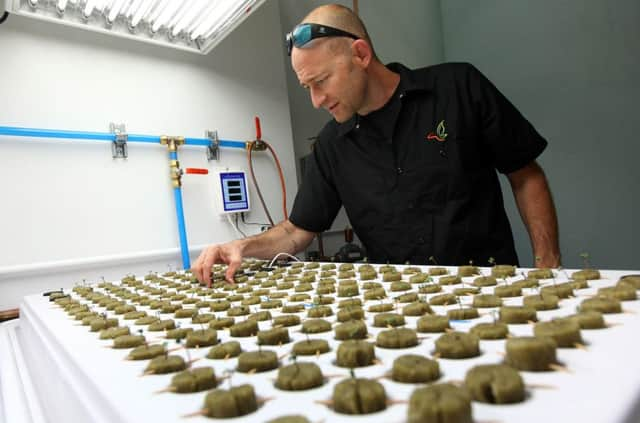High-awatha tribe torch cannabis crop to thwart raid


Flandreau Santee Sioux President Anthony Reider said the tribe had three weeks of discussions with authorities that culminated with a meeting in Washington that included a Justice Department official and US Attorney for South Dakota Randolph Seiler.
Mr Reider said the tribe wasn’t told a raid was imminent - only that one was possible if the government’s concerns weren’t addressed. He said the main holdup is whether the tribe can sell marijuana to non-Indians, along with the origin of the seeds used for its crop.
Advertisement
Hide AdAdvertisement
Hide AdWyn Hornbuckle, a Justice Department spokesman, declined to comment on specific discussions that may have taken place with tribes. Mr Hornbuckle said US attorneys have been directed to assess the threats and circumstances in their districts and consult closely with tribal partners and the Justice Department.
A spokeswoman for Mr Seiler said he would have no comment.
The tribe had planned to open a lounge selling marijuana on New Year’s Eve. It was the first tribe in South Dakota to legalise the drug following the US Department of Justice’s decision last year to allow tribes to do so on tribal land.
Mr Reider said the tribe made the decision on Friday to destroy its marijuana and burned it on Saturday. He said tribal officials wanted to avoid a raid that might have damaged equipment or the facility but also wanted to demonstrate good faith as it continues conversations with officials in hopes of resuming the project.
“We just felt it would be best to go in with a clean slate to look for answers on how to proceed so that all sides are comfortable with it,” he said.
He said more talks are scheduled this week with Mr Seiler and with state Attorney General Marty Jackley. Mr Jackley said over the weekend that the decision to destroy the crop was “in the best interest of both tribal and non-tribal members.”
The legalisation of marijuana on the Santee Sioux land came in June, months after the Justice Department outlined a new policy that allows Indian tribes to grow and sell marijuana under the same conditions as some states. Many tribes have been hesitant to jump into the pot business, and not everyone in Flandreau, about 45 miles north of Sioux Falls, supports the project.
The tribe has said the project could generate up to $2 million a month in profit. But some state officials have questioned the plan, including Mr Jackley, who has said any changes in tribal laws wouldn’t affect anyone who wasn’t a tribal member.